Loop Hero
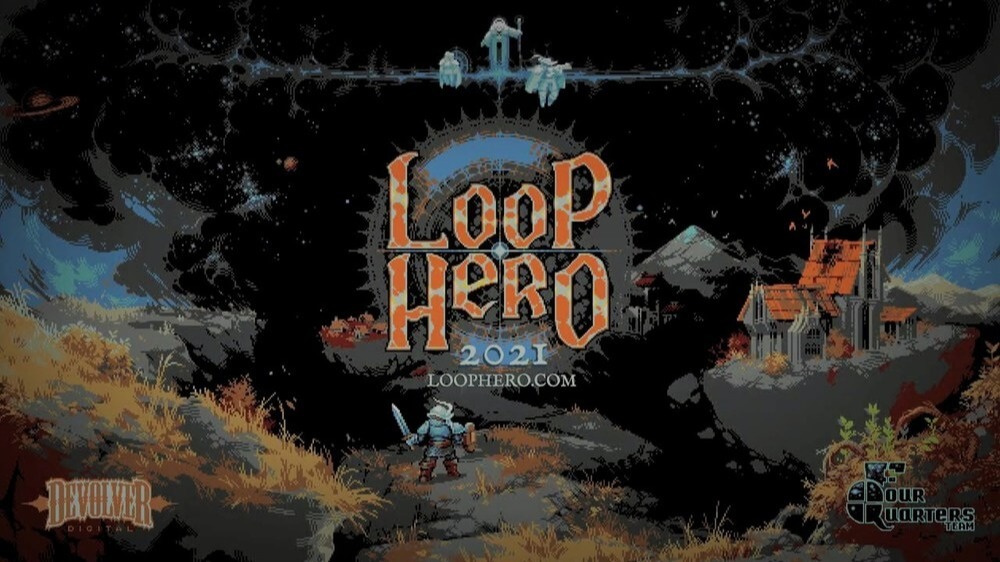
Loop Hero - the victory of content over form
The first time you encounter Loop Hero, you'll probably think you're being joked at. Even considering the overall visual style of the pixel art, the game looks like its release has been delayed for forty years. It's unimaginative, uninformative graphics and tacky, gaudy animations repel you so much that you can't even take this "miracle" seriously. But if it's that bad, where did Loop Hero get so many sales? Where does the fan love come from? History has only known two instances where the depth of mechanics has dominated the visuals. The first was Dwarf Fortress, the second was Loop Hero.
THIS has a plot!
As the developers of Loop Hero, Four Quarters said, "Loop Hero is a game in which the hero goes around in circles.
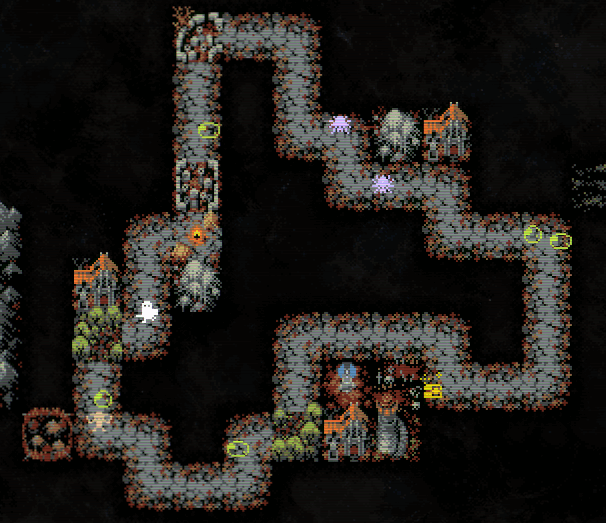
Loop Hero will most likely be brought to you by a friend or an expertly written review, or you'll hear about it through word of mouth. This pixel wonder is not suitable for self-study. Loop Hero will break its appearance to any connoisseur of high art. No matter how undemanding the gamer may be to graphics, it's hard to understand this post-meta-irony...
Loop Hero's plot is as deceptively uncomplicated as the developers' description of the game: The world has come to an end. A certain Lich has swallowed up almost the entire universe. Only a lucky few manage to survive. One of the lucky ones is the protagonist. The end of the world was not the way people made it up: no cataclysms, just all matter was consigned to universal oblivion.
Somewhere out there, in the midst of total darkness, the mountains rose. As soon as the nameless protagonist recalls the mountains, they immediately rise up before his eyes. "There was a village here," the hero recalls in the midst of the black void, and the settlement materializes out of the void. But the more the hero mentally rebuilds the world, the more he attracts the attention of the Lich and those behind the End of the World. When the villains notice attempts to revive the world, they will try to suppress these endeavors. Whether or not they succeed is up to the player; however, you still haven't heard an argument as to why you should try Loop Hero...
Depth in minimalist camouflage
Loop Hero is a fiendish mix of the old guard game building genres: roguelike, action-RPG, city-building strategy and collectible card game all in one. It's a little difficult to comprehend, so it's worth taking the game apart:
Loop Hero is a roguelike - as Four Quarters said: the point of the game is that the character goes around in circles. The character is not immortal. Once you lose a battle, the current character is permanently removed from the game. All that remains after death are the resources that the player gained during the adventure. Once the hero has passed one cycle, the player is presented with a choice: run or stay. If to run away from the battlefield - we save 60% of the loot, if we die - only 30%. It is necessary to correctly calculate the forces to balance between benefit and risk.
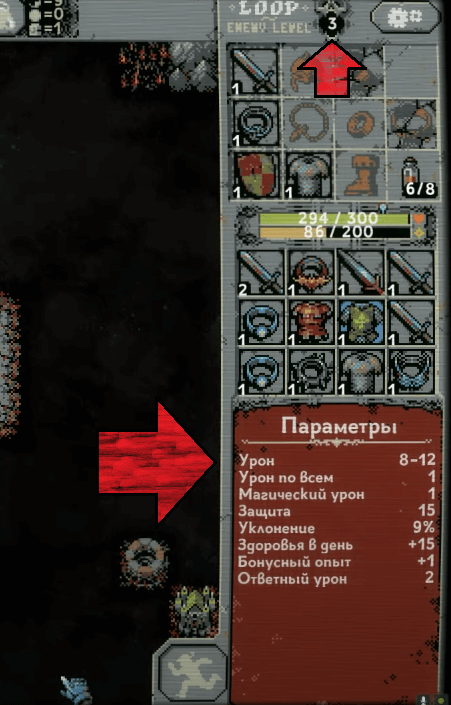
It's impossible to skip Loop Hero. As in any roguelike, the protagonist is initially weak. The only way to overcome all the trials is to try all the options offered to pass, and there are dozens or even hundreds of them. The magic of Loop Hero in attitude: Loop Hero does not consider the player a child. No tutorials, no hints, Loop Hero has no room for casuals. The only way to get the hang of it is to systematically learn the game. Loop Hero forces the player to turn on his brain, for a successful mathematical calculation and foresight the player gets a rush of dopamine. "I'm smart, I could do it," the player thinks. It is at this moment that Loop Hero captivates.
Loop Hero is an auto-battler - Loop Hero has automatic duels. Your character uses items and abilities himself, so it's not the course of the fight that depends on the player here, but the preparation for it: put on the right items, learn talents for the situation, stock up on elixirs, organize the supply to the camp, etc.
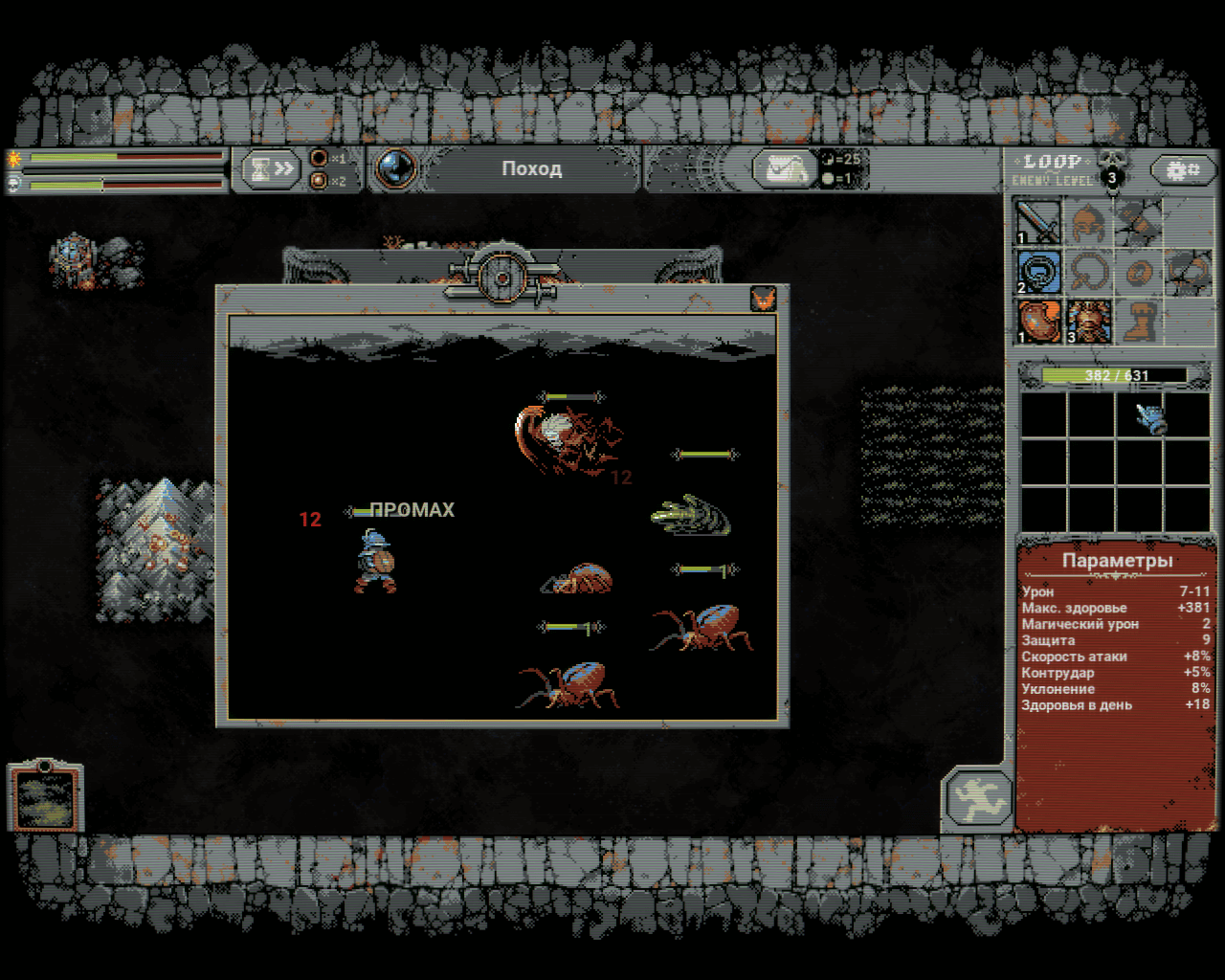
The difficulty is not pushing buttons. Loop Hero's control is limited to pressing two buttons. The difficulty is to set up your character so that he has no problems against all kinds of enemies, and there are dozens of them. For example: it is necessary to hit vampires hard, otherwise they will heal all their wounds in battle; against spiders you need the attack speed, because they envelop the protagonist in a cocoon, which disappears only from the player's attacks; against bosses it is important Critical Damage or Armor, because such fights are better not to drag on. The longer the battle lasts, the stronger the boss. And now imagine the joy of being able to put together a versatile fighter and defeat those who previously seemed invincible. Hundreds of nuances and subtleties, dozens of ways to pass the game - this is about Loop Hero.
Loop Hero is an Action-RPG, which offers you a choice of three playable characters: Warrior - based on physical strength and armor durability; Rascal (Robber) - master of close combat, wields two blades simultaneously, dodges attacks, and the class ability allows him to buy things for the number of kills, not to sell trophies; Necromancer - he does not rush into battle, but calls the devil to his side. Necromancer relies on summoning books, grimoires and amulets. The choice of character determines the style of play and future items. Loop Hero is a bit like Diablo, only without the need for active abilities. Initially available only Warrior, the other classes are unlocked in non-obvious ways - another task, of which there are hundreds...
In addition to items, each character has a branch of talents and passive skills. After a successful duel, the player receives a card (about cards later) and items. Items are divided into rarities and dropped at random. The progression of character progression in Loop Hero is slow. Often the player is forced to change one sword, say, from 12 damage to a sword with damage 13. Vain attempts to knock out an extremely powerful item at once, you have to use what seems to be the best at the moment - so Loop Hero smoothly introduces everything in the game. Initially the game seems primitive, but gradually turns into a hardcore role-playing game. Just compare the first screenshot of this article to this one:
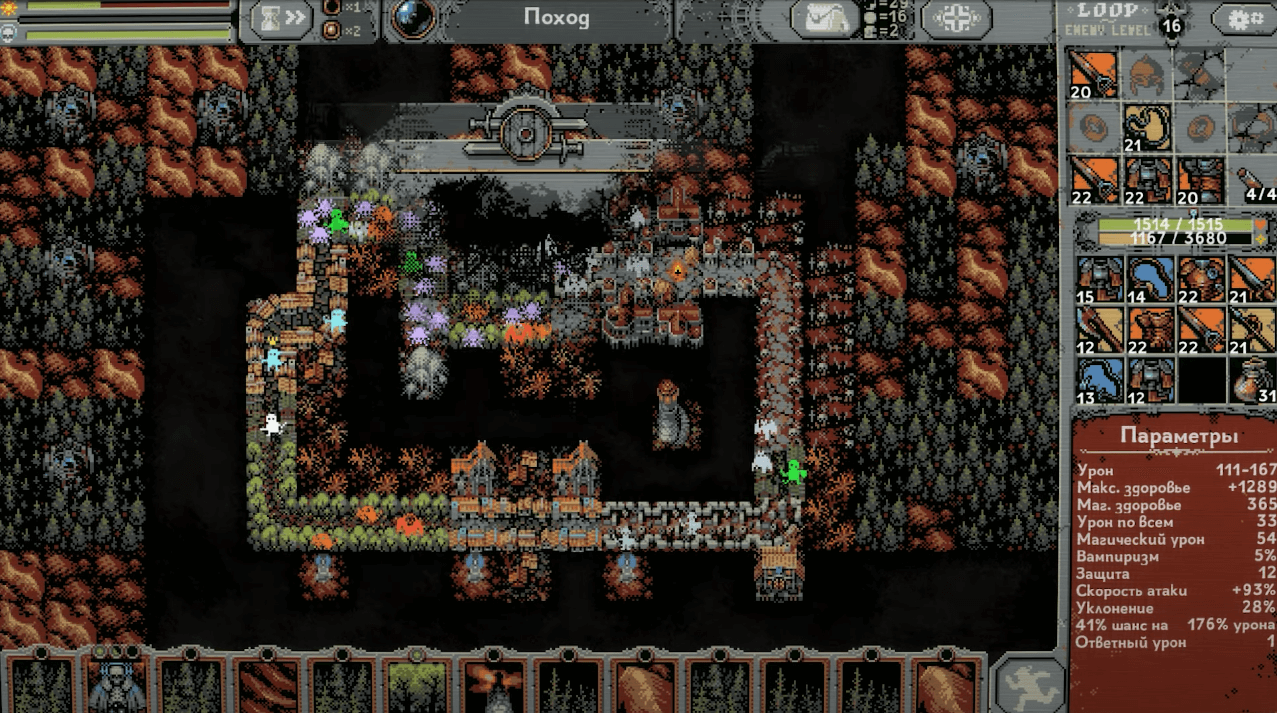
Everything that is in the RPG genre, if in Loop Hero. It's easier to name what the game doesn't have - no Charisma characteristic and moral choice system, no riding animals, and, of course, multiplayer.
Loop Hero is a collectible card game - after each fight our protagonist receives a card of memories. This card adds one new element to the world, be it a mountain or a village. Each card has direct and indirect effects on the world. The direct impact is written directly on the cards, and the indirect impact...that's where the fun part comes in.
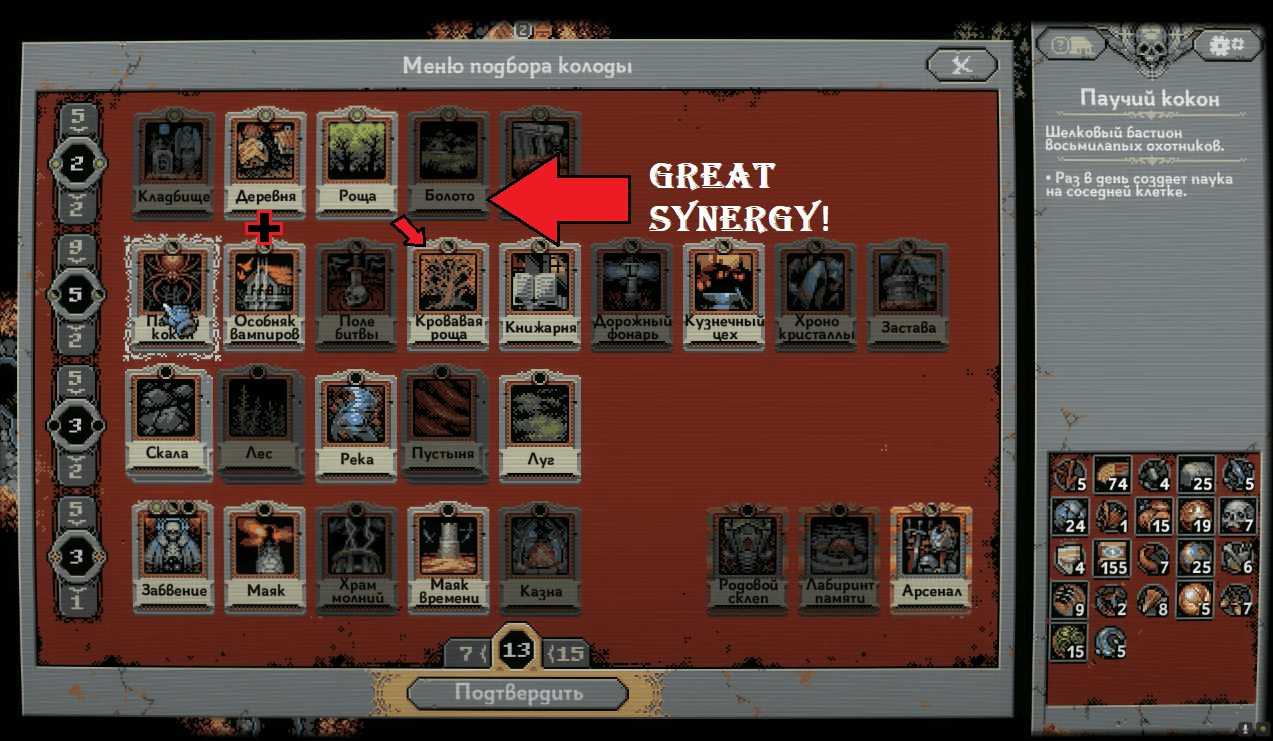
Loop Hero has hundreds of combinations hidden from the player's eyes: you can build a village, pass through its streets each round, and the inhabitants of that village will heal your character and give you the typical RPG "go-kill" task. With each round it will become more and more difficult for the character to reach the village, and the player may decide to build another village nearby in order to double the treatment. But nobody will tell him beforehand that mean ruffians will set up camp between two villages and try to rob the protagonist...There are a lot of unexpected combinations, thanks to which Loop Hero blows your mind. With combinations of cards you can accidentally summon too strong opponents and even a hidden boss. Loop Hero is a serious solitaire game.
Loop Hero is a City Building Strategy - in addition to the basic hero progression, Loop Hero also has meta progression - behind-the-scenes progression. The few survivors that remained after the destruction of the world, settled on the outskirts, set up camp there. It's the camp we have to rebuild.
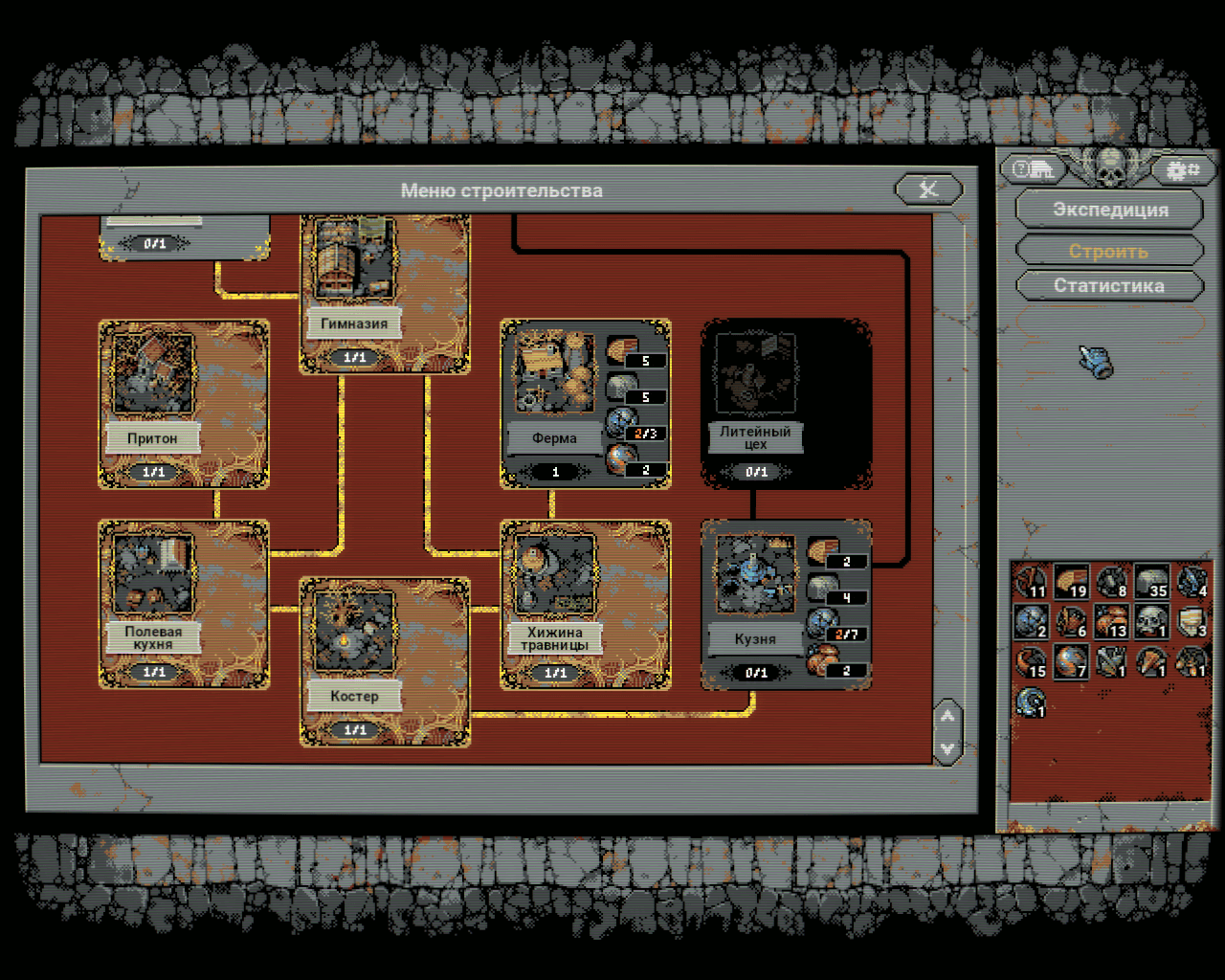
The player mines resources in races. So that some resources are not in excess and others in short supply, you have to change your style of play, you have to think again... Buildings make each new attempt at passing not only easier, but will also deepen the game's lore. There is a whole bio on each of the creatures in the individual buildings. Nothing interesting if Four Quarters didn't write funny descriptions for the creatures in the bestiary. The developers deliberately wrote like graphomaniacs to bring a touch of humor to the game.
The poisonous mixture of all these elements makes Loop Hero a variant time-killer. It's more interesting to figure out the game yourself - without guides and hints, to cram in bumps and lose until a winning tactic builds in your memory. Re-playability lasts for 20-50 hours. And it's not twenty hours of sweeping empty open worlds, but twenty hours of hardcore exploration of the role-playing system - just like in the heyday of board games.
Is Loop Hero worth buying?
Only after getting to know the game in person or at a great discount. Loop Hero is a jewel of the indie sector, but only lovers of role-playing games can appreciate its value. Do you enjoy spending hours assembling your dream character? Do you ponder for a long time on what to pump: armor or evasion? Are you bursting with joy when you manage to put together a winning set of items and abilities on your own? If you answered yes to at least one question, take a closer look at Loop Hero...
